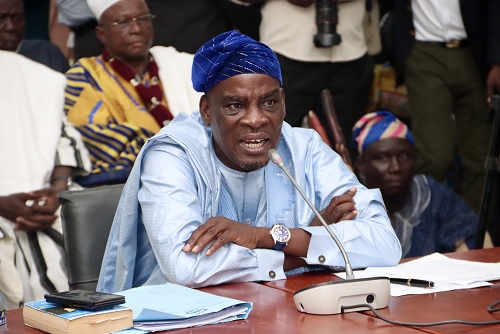
I will spearhead GETFund uncapping — Haruna Iddrisu
The Minister designate for Education, Haruna Iddrisu, has stated that he will spearhead the uncapping of the Ghana Education Trust Fund (GETFund) to unlock additional resources for the country’s educational infrastructural development.
He said uncapping the GETFund would help release about $3 billion, which would make a total of $7.9 billion available to the Ministry of Education for expanding infrastructure.
Consequently, he stressed the need for the government to engage with the International Monetary Fund (IMF) to review the memorandum which limited the fund’s potential.
The revision, he said, would ensure that the GETFund would fully support the development of education in the country, especially higher education.
Mr Iddrisu was answering questions when he appeared before the Appointments Committee of Parliament which was vetting him for the position.
Engagement
Leading the Minority side on the committee to table questions was the immediate past Minister of Education, Dr Yaw Osei Adutwum, who wanted to find out how his successor would address accommodation for teachers in the rural areas.
The Minister designate said the government would engage with stakeholders and re-align financial resources to improve teacher accommodation in rural areas.
He said the District Assemblies Common Funds (DACF) could be used to provide better living conditions for teachers in rural areas to attract and retain them in underserved areas.
Mr Iddrisu, who in previous administrations of the National Democratic Congress served as Minister of Communication, Trade and Industry and Minority Leader in Parliament, also stressed the need to revitalise the public education system, especially in rural areas.
He pointed out the gap in education quality between rural and urban areas, with students in rural regions often experiencing substandard conditions.
“There is a critical rural-urban dichotomy in the quality of education, and we must address this imbalance urgently,” he said.
The Minister-designate said many schools in the Northern Region, for instance, faced particular challenges due to the lack of qualified teachers and inadequate infrastructure.
He, therefore, said there was a need for policies that made education accessible to all children, regardless of their financial background.
“No parent should need a loan to send their child to school. We need to make sure every child can attend a good public school,” Mr Iddrisu added.
Funding
Addressing a question on educational funding, the Minister designate for Education proposed the dedication of 20 per cent of national expenditure to education or allocate a minimum of five per cent of Gross Domestic Product (GDP) to the education sector for over 10 years.
He expressed the belief that doing so would allow the country to expand and improve basic education infrastructure.
The Education Minister designate also pointed out that the government would ensure that graduates from the Free Senior High School programme were employable.
“This is why initiatives in technical and vocational education and training (TVET) are essential. Employability is more valuable when linked to TVET, and we must expand access to TVET institutions,” he added.
He said although lack of funds had limited the full implementation of some initiatives, the government would prioritise completing these institutions to fulfil the Directive Principles of State Policy as enshrined in the Constitution.
